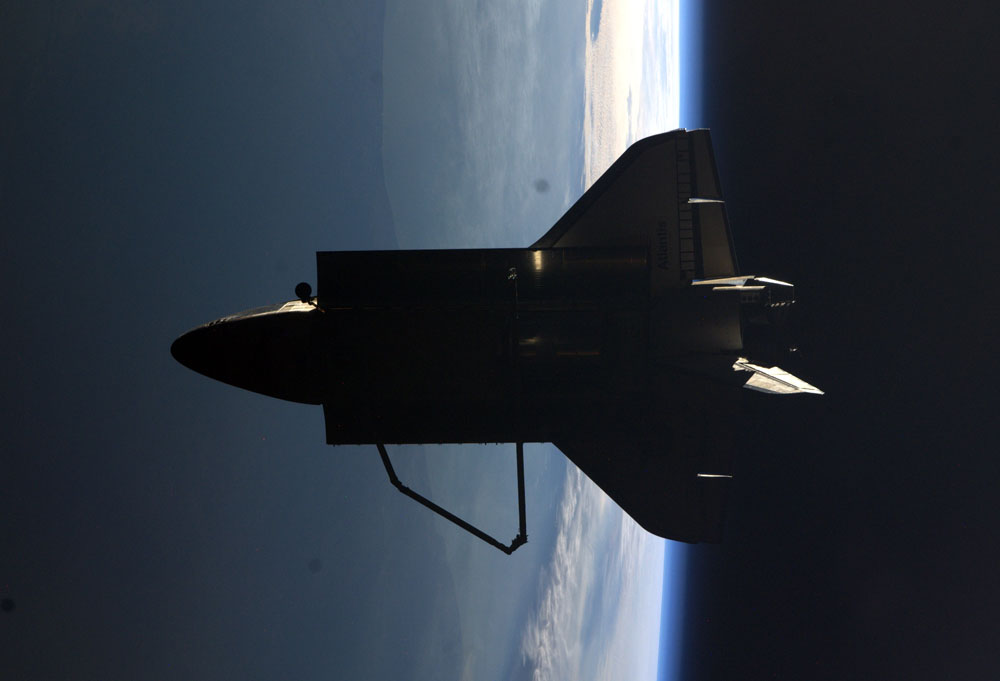
Space Shuttle Astronauts Prepare for One Last Trip Home

HOUSTON — There's just one more day in orbit left for the four astronauts on space shuttle Atlantis, the last men and women ever to fly on a NASA shuttle.
Commander Chris Ferguson and his crew have worked steadily and successfully through the bulk of their 13-day mission. The astronauts departed the International Space Station yesterday (July 19), after delivering a huge load of backup hardware and supplies. [Photos: Shuttle Bids Farewell to Space Station]
Now Atlantis is packed to the brim with trash and other items to be brought back to Earth, and the astronauts are making their final preparations for a planned predawn landing on Thursday (July 21).
"The crew is doing great," LeRoy Cain, chair of Atlantis' mission management team, said in a briefing on Tuesday (July 19). "They’ve performed an outstanding mission. We're focused now on getting Atlantis and the crew back."
Satellite deployment
The STS-135 Atlantis crew awoke Tuesday at 9:29 p.m. (0129 GMT Wednesday) to the tune of "Fanfare for the common man" by Aaron Copland, played along with a video message from employees at NASA's Kennedy Space Center in Florida.
"Good morning, Atlantis! Kennedy salutes you. See you back at wheel stop," the crowd cheered.
Get the Space.com Newsletter
Breaking space news, the latest updates on rocket launches, skywatching events and more!
"Good morning, Houston, and to the great folks at the Kennedy Space Center who've cared for these vehicles for the last 30 years, a special good morning to you," Ferguson said.
The main task on tap for today is the final satellite deployment of the space shuttle's career. The astronauts will deploy a tiny spacecraft dubbed "PicoSat" that will perform two experiments for the U.S. Department of Defense. The 8 pound (3.7 kg) mini satellite is outfitted with propulsion and communications systems, a GPS unit and solar cells for gathering energy.
One goal, called the Miniature Tracking Vehicle experiment, will test whether a nanosatellite like the PicoSat can serve as an orbiting reference point for ground tracking systems. The second, called Compact Total Electron Content Sensor, will monitor space weather and detect the density of the Earth's ionosphere.
The satellite is expected to operate for three to nine months.
Busy day in space
In addition to the satellite deployment, Atlantis astronauts will have their work cut out for them checking out all the various spacecraft systems that are vital for re-entry and landing. [Photos: NASA's Last Shuttle Mission In Pictures]
To make room for carrying more cargo on its final mission, Atlantis' crew was shrunk down from the usual six or seven astronauts to just four. This meant that each spaceflyer has had to hustle to get all the necessary work done throughout the mission. This will especially be the case on their last full day in orbit.
"That’s a day we think will be challenging to get through with the reduced number of crew, because the amount of things we have to do have not decreased with the crew size," shuttle flight director Kwatsi Alibaruho said during a briefing Monday (July 18).
End of the line
When Atlantis rolls to a stop on Thursday, weather permitting, it will cap off 30 years of space shuttle flights for NASA. Following the retirement of the shuttle program, Atlantis and its two sibling orbiters will be put on public display at museums while NASA begins building spacecraft to carry humans to an asteroid and Mars.
The shuttle's ending, NASA officials often say, is bittersweet.
"I choose to view this more in terms of celebrating what we've been able to do, feeling very good about what we've been able to accomplish," Cain said. "What you don't see are the thousands of people behind the scenes, and those folks are the ones that deserve the credit. What's most important for me as I sit here today is I really want to congratulate the entire team."
You can follow SPACE.com Senior Writer Clara Moskowitz on Twitter @ClaraMoskowitz. Visit SPACE.com for complete coverage of Atlantis' final mission STS-135 or follow us @Spacedotcom and on Facebook.
Join our Space Forums to keep talking space on the latest missions, night sky and more! And if you have a news tip, correction or comment, let us know at: community@space.com.

Clara Moskowitz is a science and space writer who joined the Space.com team in 2008 and served as Assistant Managing Editor from 2011 to 2013. Clara has a bachelor's degree in astronomy and physics from Wesleyan University, and a graduate certificate in science writing from the University of California, Santa Cruz. She covers everything from astronomy to human spaceflight and once aced a NASTAR suborbital spaceflight training program for space missions. Clara is currently Associate Editor of Scientific American. To see her latest project is, follow Clara on Twitter.









